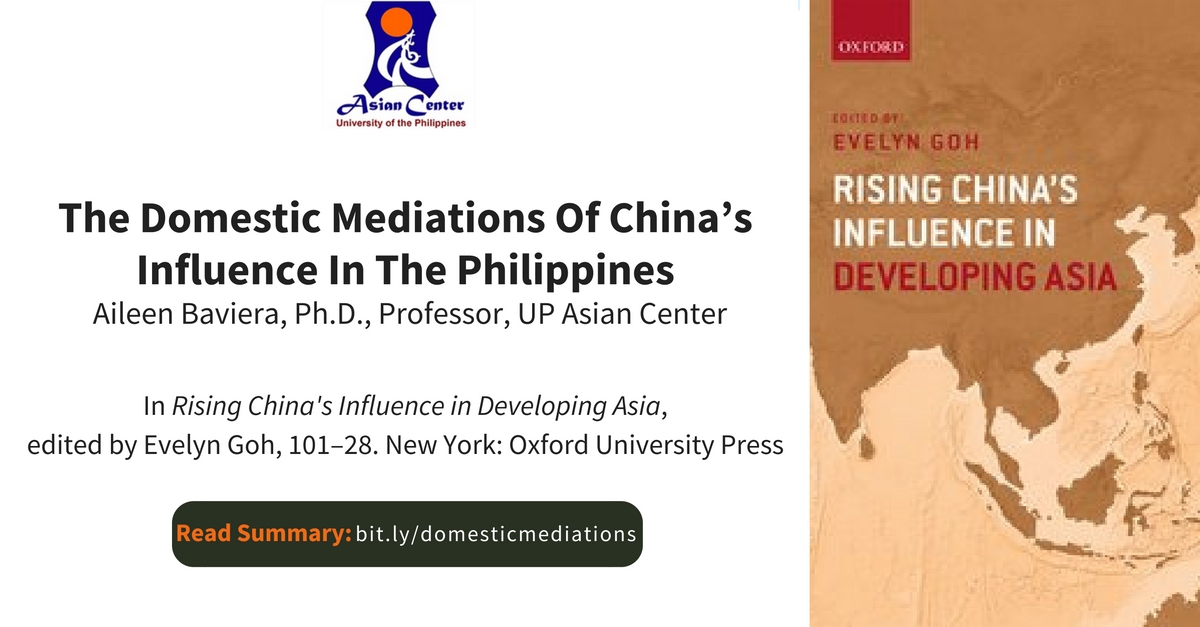 The Domestic Mediations of China’s Influence in the Philippines” by Professor Aileen S. P. Baviera of the UP Asian Center was published in Rising China's Influence in Developing Asia, edited by Evelyn Goh and published in 2016 by Oxford University Press.
The Domestic Mediations of China’s Influence in the Philippines” by Professor Aileen S. P. Baviera of the UP Asian Center was published in Rising China's Influence in Developing Asia, edited by Evelyn Goh and published in 2016 by Oxford University Press.
In the book chapter, Professor Baviera asks whether “China’s material power—underpinned by growing military and economic resources—[has] translated into greater influence in the Philippines, particularly over political and economic policy decisions of the Philippine government” (102).
To provide an answer, she looks at “case studies, which process-trace major Philippine policy decisions in which China played an important role” (103).
-
“Case #1, the South China Sea ‘Joint Marine Seismic Undertaking’ was a precursor to joint resource development (China’s preferred approach) and if successful, could have conceivably reduced the role of ASEAN, the U.S. or international law in addressing the competing claims, while strengthening China’s strategic position” (109)
-
"Case #2, the NBN-ZTE agreement, is an example of how Chinese wealth, made accessible to developing country elites in the form of ODA, can undermine already weak legal institutions and governance norms in a recipient country, not to mention eventually deepening their asymmetric dependencies “ (109)
-
"Case #3, the Scarborough Shoal standoff, gives us insight into how Manila-Beijing relations intersect with the wider strategic competition between China and the U.S. China’s move on the shoal... was seen by Filipinos as an expansion of China’s claims in the South China Sea. U.S. response to the standoff has been to intensify its involvement in the South China Sea issue” (109)."
Based on these case studies, Dr. Baviera concludes that "how China’s power translates into influence (defined as changing the outcomes to favour one’s interests) depends less on the amount of power than it does on other factors including its successful cultivation of allies among members of the Philippine political elite and whether or not there are countervailing sources of influence at the systemic level….” (127).
Dr. Baviera finds that “Philippine foreign policy decisions ... were responsive to persuasion and inducements by China when elite networks prevailed...but political actors and interest groups not in favor of Chinese interests can quickly block China’s channels of influence. " (C)oercion and intimidation played a more important role when China perceived high strategic stakes with the involvement of the U.S. But in each of the cases, "the Philippines has not been so helpless in the face of China’s superior resources, and Chinese influence is not as efficacious as might be deduced from the scale of power asymmetry alone” (127–28).
Dr. Aileen SP. Baviera is Professor at the Asian Center, University of the Philippines Diliman. She specializes on and writes about contemporary China studies, China-Southeast Asia relations, Asia-Pacific security, territorial and maritime disputes, and regional integration. The editor in chief of the journal, "Asian Politics & Policy," she is the author of many academic publications and completed her Ph.D. in Political Science at the University of the Philippines Diliman. VIEW FULL PROFILE.
The UP Asian Center offers M.A. programs in Asian Studies with four fields of specialization: Northeast Asia, Southeast Asia, South Asia, and West Asia. The Center also has an M.A. program in Philippine Studies that allows students to major in Philippine society and culture, Philippine foreign relations, or Philippine development studies. The Center offers a Ph.D. program in Philippine Studies in conjunction with the College of Arts and Letters and the College of Social Sciences and Philosophy. Get an overview of these programs. The Asian Center also houses a peer-reviewed, open-access journal, Asian Studies: Journal of Critical Perspectives on Asia. It has published several books and monographs, and hosts or organizes various lectures and conferences.

